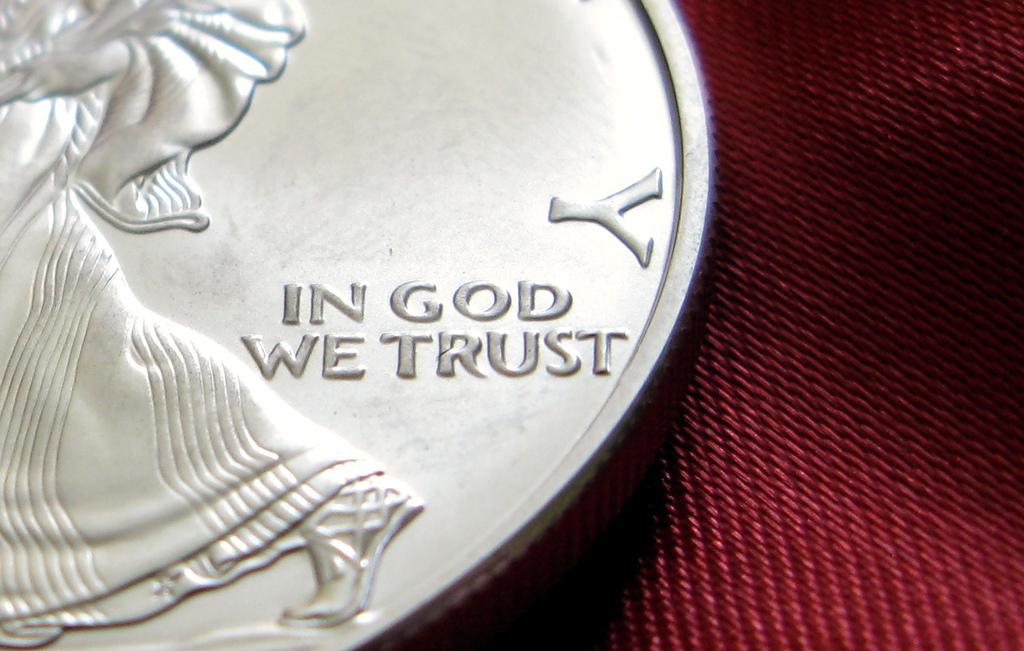 (Credit: Kevin Dooley, Flickr Creative Commons)
(Credit: Kevin Dooley, Flickr Creative Commons)
Religious persecution, we’re told, is rampant throughout the United States today.
And that’s true.
It is.
Religious persecution is indeed very real in America these days…for Muslims.
But to hear it from conservative leaders and talking heads like Todd Starnes who recently moderated a panel of aggrieved Christian business owners at the National Religious Broadcasters convention in Nashville, it’s Christians – not Muslims – who are the target of America’s anti-religion crusade. Starnes, if you’re not familiar with his work as a Fox News columnist, is the poster child for the fabricated religious controversy industry. Starnes turns a profit pandering to the base fears of conservative Christians by using half-truths and outright lies to create what seem like indisputable examples of Christian persecution in America. As intended, the manufactured outrage spreads like wildfire across the web and before you know it, Christians are rallying on the steps of their state capitols and little old ladies are fanning away their fears in the pew on Sunday morning as their pastor convinces them the end is nigh because here’s the proof!
Of course, Starnes is not alone in his crusade to “take back our country.” Conservative Christian leaders across the land have been stoking the fears of their constituents with the assurance that, among other things, the Supreme Court’s decision to overturn anti-same-sex marriage laws is not only a sign of the apocalypse and our nation’s eroding morality, it’s a full-frontal assault on the Christian faith itself.
Citing as further proof are the now infamous handful of cases in which bakers and florists, wedding chapel owners and country clerks have faced fines and other legal consequences for refusing service to same-sex customers, claiming that to serve them would somehow be a violation of their “deeply held beliefs.” Never mind the fact that neither the Supreme Court nor any other branch of the United States government has taken any action whatsoever to infringe in any way upon Christian worship in any church or the practice of Christianity by any individual in their own private lives. The government is coming after our religion!
Right after Obama takes away our guns.
Conservatives – both religious and political – lost a major Supreme Court battle and decided that though the Court’s decision dealt only with who the state should issue a marriage license to, this was actually part of a much larger war over religious freedom. Thus flowed from conservative state houses around the country, so-called religious freedom bills ostensibly intended to protect the religious freedom of a particular state’s citizens or at least the Christian citizens in that state who wanted nothing to do with their LGBT neighbors. These utterly unnecessary and thinly veiled justifications of discrimination bills have been lauded by manyChristian leaders as reclaimed territory and critical defensive fortifications in the all-important war to maintain religious freedom.
Unfortunately for these holy warriors, the religious freedom war is a battle the Church simply cannot win no matter how hard it fights.
There are at least 3 reasons why this is so.
First of all, the Church cannot win the religious freedom war because it (and every other faith in America) has already won. The First Amendment of the Constitution has guaranteed religious freedom in the United States for almost two and a half centuries and nothing – absolutely nothing – has changed that fact in recent years despite what folks like Todd Starnes and his Fox News informed cohorts would like you to believe. No agent of the government has stepped into a place of worship to tell any congregation – Christian or otherwise – how they should worship while they are there or when they go home once the service is over.
And no clergy member of any faith has ever been forced by the government to marry anyone to anyone in any church or synagogue or mosque anywhere in the United States.
Again, if any religious group in this country has had the private practice of their faith threatened, it’s not Christians. It’s Muslims. And in what might be the most fitting or awkward bit of irony (depending on your perspective) in all of this, the calls to have Muslim worship monitored often come from the very same people decrying the supposed war on religious freedom – conservative Christians.
Our government – and society in general – may indeed operate under less of a Christian veneer that it did in generations past. However, losing political power and having your personal religious freedom are not at all the same thing. Christians are every bit as free to practice their faith in their private lives and in their places of worship as they’ve always been – which is the right of religious freedom guaranteed by the Constitution, not the right to force others to conform to your religious ideology in the public sphere. It may have been the case in the past that Americans in general were implicitly expected to abide by Christian religious norms and, no doubt it is the loss of this place of privilege that is being mourned. But those “good old days” when Christians were in charge witnessed the rise of Jim Crow laws in the Bible Belt and centuries worth of slavery that was often blessed and sanctified by the Church. Those are not days we should ever visit again.
The fact of the matter is religious political influence may have indeed eroded in recent years, but religious freedom is alive and well.
Secondly, the Church cannot win the religious freedom war because any of the religious freedom laws currently being passed sanctioning discrimination in a given state will eventually be overturned just as their ideological forefather Jim Crow eventually met his demise. The sorts of laws that allow bakers to refuse to bake cakes for LGBT couples don’t actually protect religious freedom. They empower some religious people – in this case, conservative Christians – to force their religious beliefs on others in the public square. Being required to provide equal service to everyone is not an act of religious persecution. It’s a matter of equality.
We may not always live up to our own ideals, but discrimination is antithetical both to the American ethos and the American legal system. It may have its unfortunate day in the sun for a while, but it eventually withers on the vine as the long arc of history bends towards justice.
The hard to accept truth for LGBT excluding churches is that their children or grandchildren or great-grandchildren (deepening on how old they are now) will grow up in a world in which opposition to same-sex marriage will be every bit as incomprehensible as opposition to interracial marriage is today. It’s the preparation – or lack thereof – for this unavoidable future that leads us to the third and final reason why the Church cannot win the religious freedom war.
Beyond the legal debate, the Church cannot win the religious freedom war because even if the Church “wins” the imaginary legal battle, it loses the war because the message sent to LGBT community (and its supporters) will have been made crystal clear: we despise you so much we’re willing to go to war to ensure we don’t have to serve you anywhere.
There is a concerted effort by many non-LGBT affirming churches to stress how much they love their LGBT neighbors despite their refusal to allow them to be fully included in the life of the church. I have no doubt many of these folks are sincere in their profession of love for their LGBT neighbors, but that message of love is utterly silenced (and negated) when the actions of the Church are focused on the exclusion of and ability to discriminate against the very people who are supposedly an object of love.
Perhaps the biggest problem undergirding this disconnect between profession and action is the sort of rhetoric that says “God and/or the Bible never changes, therefore we can’t change” our position. This goes not just for the inclusion of LGBT folks, but any number of other contentious issues as well. While the Bible may not change, our interpretation of it most certainly does and should as we learn more about it, about the world in which it was composed and the world in which we live. That still doesn’t mean we will all arrive at the same conclusions, but fundamentalism has had such a firm grip on the Church for so long that we refuse to relinquish our stranglehold on the Spirit and allow the Spirit to do what the Spirit does – move and speak in new, fresh, and life giving ways.
There’s a fine line between conviction and intransigence. Christian conviction stands firm in the essentials – things like the creeds and early Church councils – while approaching non-essentials with humility, acknowledging not only our ability to be wrong, but the propensity for Christians to disagree about any number of things. Conviction is a fundamental part of any religious practice, but theological intransigence is not a Christian virtue. It’s a vice that turns our ability to speak the good news in the tongues of men and angels into nothing more than a resounding cymbal or a clanging gong.
God may be perfect, but we are not. We are prone to mistakes, even and especially when it comes to interpreting God-breathed scripture. It’s our ability to admit and learn from those mistakes so that the Spirit has the freedom she needs to continually shape and form us that has allowed the Church to endure over the centuries. If we didn’t learn from our theological mistakes, slavery would still be sanctified and lepers would still be excluded lest they spread their sins to others.
We still have a lot to learn.
Both about ourselves and each other.
Religious freedom is not just a wonderful right, it’s a critical foundation stone for any democratic society to build upon. But religious humility is just as important. It’s what allows us to live in peace and (relative) harmony with neighbors of a different faith or no faith at all.
In losing our place of political privilege, we’ve also lost our religious humility. We’ve forgotten what true religious freedom looks like in a pluralistic society and in our attempt to restore our place of prominence, we’ve marginalized and ostracized the very people Christ calls us to love and serve – our neighbors.
We may not all agree on exactly what it looks like to practice our faith in the public sphere (or in the private sphere for that matter), but if the Church doesn’t lay down its arms in the war over religious freedom and begin beating its swords into plough-shares, the Chicken Little cries of the Church being on the brink of extinction in America may very well become a self-fulfilling prophecy.












